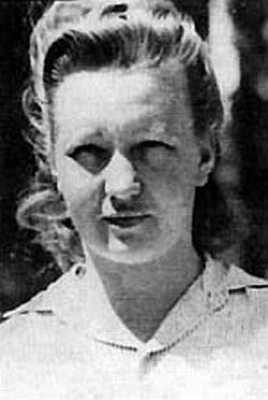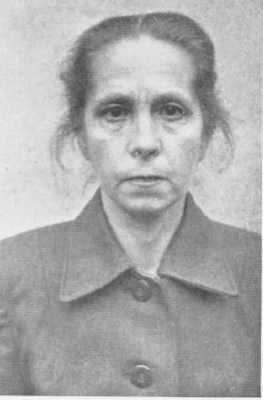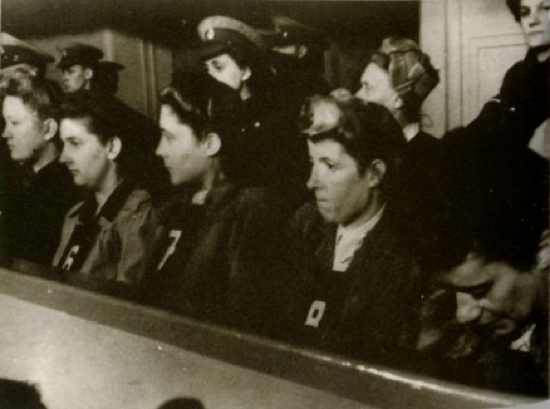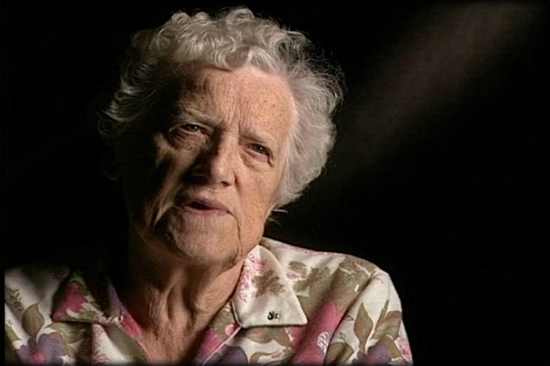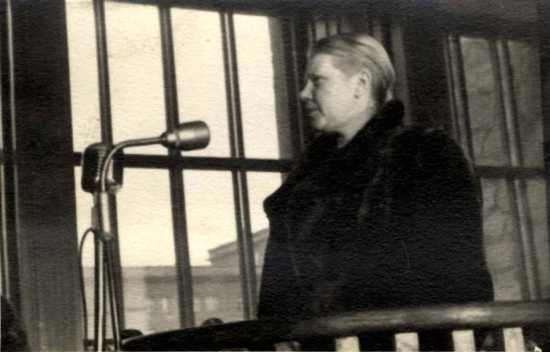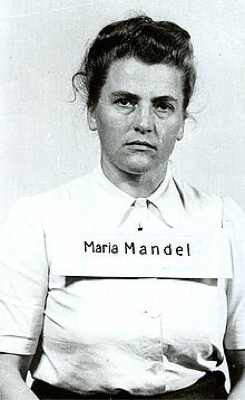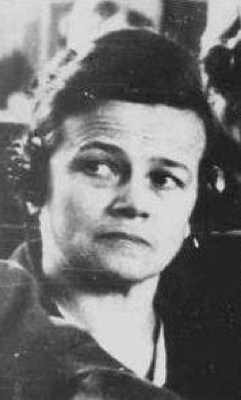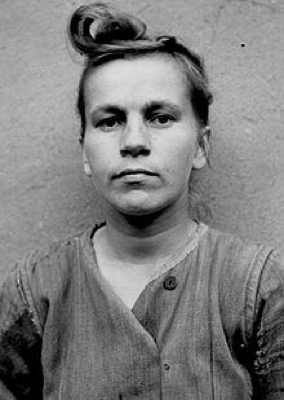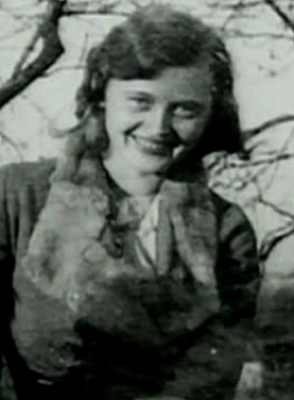Beginning in 1939 Binz began a career as a concentration camp guard eventually rising through the ranks to become deputy chief wards at Ravensbruck and later Buchenwald. Described by the prisoners as “unyielding” Binz was well known to beat, shoot and whip the females in her charge. In one instance of particular brutality she is reported to have chopped a prisoner to death with an axe during a forced labor assignment. While she fled at the close of the war she was caught, tried and on May 2, 1947 executed for her crimes.
In 1939, Bormann joined the Auxiliary SS to, as she put it at her trial, “earn more money.” From then on her career took her through some of the most notorious of Germany’s camps among them Ravensbruck, Auschwitz and Bergan-Belsen where she was stationed at the close of the war. Noted for her brutality, Bormann was well known for having the German shepherd which accompanied her attack the prisoners. In the end though her cruelty and sadism came back to haunt her when she was convicted of murder and executed on December 13, 1945.
A nurse by profession starting in 1939 Bosel worked at Ravenbruck concentration camp as a “work imput overseer.” Essentially what this meant was that Bosel was among those who decided which prisoners would be immediately gassed and which would be sent to work camps. Apparently her philosophy was right in line with that in the Nazi hierarchy since she is quoted as having said of the prisoners, “If they cannot work let them rot.” On 3 May 1945, following the Hamburg Ravensbruck War Crimes Trial, Bosel was executed for maltreatment, murder and taking part in the selection process.
Yet another nurse who apparently forgot the healing touch. After her conscription in 1942, Bothe served the majority of the war at the Stutthoff camp near Danzig. Described at her trial as a “brutal” overseer, Bothe was captured at Bergen-Belsen where she oversaw a wood detail after evacuating Stutthoff in the face of the advancing Soviets. While described as sadistic and inhumane, her crimes apparently did not raise to the level of some of her coworkers so rather than hang she was sentenced to ten years in prison although she served only six before receiving clemency from the British government. Sixty years after the war in the course of an interview she was asked about her decision to work as in a concentration camp. “Did I make a mistake? No. The mistake was that it was a concentration camp, but I had to go to it, otherwise I would have been put into it myself. That was my mistake.”
Beginning in 1942, Lächert developed a reputation for brutality during her service at Ravensbruck, Majdanek and Auschwitz. Following the war, she was sentenced to fifteen years for her service at Auschwitz, although she was released in 1956 having served only nine. Her freedom was fleeting however, because in 1975 she was tried for participation in the selection process, releasing her dog onto inmates and general abuse and sentenced to an additional twelve years.
A latecomer, Klaff had worked in a jam factory until she was assigned to Stutthoff in 1944 where she served until the end of the war in 1945. Arrested by Polish officials that same year she was tried and later executed for her crimes. It is interesting to note that she is quoted as saying, “I am very intelligent and very devoted to my work in the camps. I struck at least two prisoners every day.” Perhaps given that she said this at her trial she may have overstated her level of intelligence.
Orlowski worked at a veritable who’s who is Nazi concentration camps, developing a reputation for particular sadism at each. She was particularly well known for whipping prisoners across the eyes which was not only painful but also often rendered them unfit for work and caused their extermination. Another particular evil of Orlowski’s, was throwing the children on top of the other prisoners being sent to the gas chambers in a “space saving operation.” In 1945, with the war near over, she seemed to have turned over a new leaf. During a death march from Auschwitz-Berkenau to Lolau she comforted the prisoners, provided them water and even slept alongside them on the ground. Whether this was sincere or not is debatable but unlike many guilty of similar crimes she received life imprisonment rather than execution and was released after only serving ten years. In 1976, during a second trial, she died at the age of 73.
Mandel held positions at a variety of camps before she was named female commandant of the notorious Auschwitz-Birkenau concentration camp. Having already honed her skills by meting out punishments at other camps, Mandel fell into step there quickly and is believed between 1942 and 1945 to have been directly responsible for the deaths of 500,000 prisoners. Sadistic by every measure during her time at Auschwitz, she is known to have selected Jews to serve as her “pet.” When she tired of them, she sent them off to the gas chambers. She is also known to have created the Women’s Orchestra of Auschwitz which performed during roll calls, executions, selections and transport. Following her trial, Mandel was executed for her crimes on January 24, 1948.
Arriving only in 1944 Neudeck rose meteorically through the ranks, eventually being assigned the rank of camp leader at one of Ravensbruck’s sub camps. Noted for her cruelty one of her prisoners testified at her trial that they witnessed her slit the throat of another prisoner with the sharpened edge of a shovel. Following the war, she fled but was captured, tried and later executed for her crimes.
After training under Dorothea Binz (#1) she was to serve at Ravensbruck and Auschwitz-Birkenau before being appointed senior supervisor at Bergen-Belsen. Well known to have participated in the execution of prisoners, at her trial she was convicted and, like her teacher, executed for her crimes.
Strictly speaking, Koch was not a guard. In fact, she was not in the SS in any capacity but her husband Karl Koch was the commander of Buchenwald and later Majdanek. Using the power that his position granted her, Koch developed a reputation for cruelty which was nothing short of unbelievable. Koch, it has been testified, was known to meet prisoners upon their arrival to inspect them for interesting or attractive tattoos. If she saw something which caught her eye, she had the prisoner executed, skinned and their skin made into useful items such as lampshades or book covers. While it has never been proven that she manufactured anything from the skins, her collection was used against her at her trials. What has also been proven is that she often instigated the torture of inmates including forcing one of them to rape another in plain sight. Unfortunately for her, in 1943 both her and her husband were arrested for embezzling from the SS and killing prisoners to cover up the crime. While he was executed, Ilse was acquitted and was free when she was arrested by the Allies. Being a rare civilian exception, Koch was tried for war crimes and sentenced to life imprisonment. She was serving out that sentence when she committed suicide in 1967.
